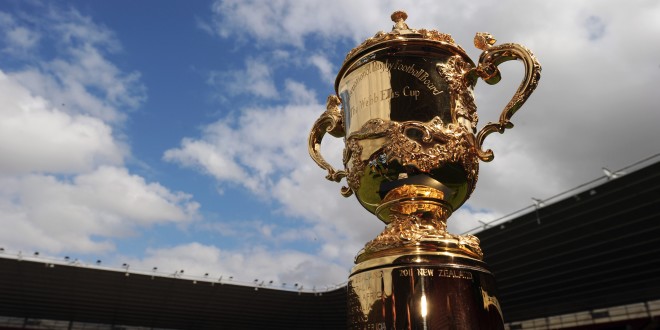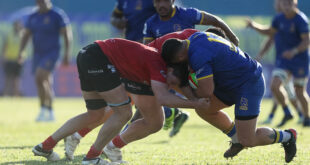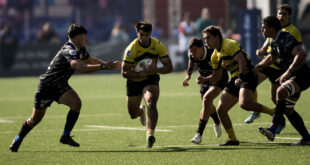An unprecedented boost has emerged for a 24 Team Rugby World Cup. Since RWC 1999 the tournament has consisted of 20 teams but this may change for RWC 2023.
The Head of Rugby World Cup is Alan Gilpin. He is also the World Rugby COO. Gilpin made it known that more not less or the same is desired.
“We are definitely looking at expansion not contraction. We’d love to move to 24 teams.”
Gilpin and World Rugby / Rugby World Cup CEO Brett Gosper are the leading organizers of the RWC. Gosper furthered the point, stating that:
“We’re always looking from an expansive point of view, rather than reducing so it’s just a question of when rather than if.”
Gosper did, however, offer caution. He confirmed the long-standing reason against expansion as being fear. The organizers seek to expand their product but also protect it. They want more competitive matches and fewer one-sided contests.
The above video is precisely what World Rugby do not want to see again. Australia completed a 142-0 victory over Namibia in RWC 2003. While match scheduling was far from ideal for the Africans the match was one which organizers desperately never want to see repeat itself.
Improvements for RWC 2007, 2011, and 2015 have seen no such repetition. Instead Tier 2 and Tier 3 competitors proved to be much better than from RWCs 1999 and 2003.
Namibia lost 58-14 against New Zealand in RWC 2015. They did so with notably more fortunate scheduling. Against South Africa in RWC 2011 they fell 87-0 and to Wales 81-7. Organizers gave Namibia just three rest days between the matches, something entirely unacceptable yet green-lighted by World Rugby.
Losing by scores of this magnitude are what Gilpin, Gosper, and the entire team of organizers seek to avoid. World Rugby itself can assist greatly and has partially done so in the form of better scheduling, in addition to increased funding.
An additional example to Namibia is Uruguay. The South Americans joined Namibia in RWCs 1999, 2003, and 2015. This includes a notable repeated fixture from 2003 and 2015 – England vs Uruguay.
Uruguay was defeated 111-13 in 2003 and 60-3 in 2015 by England. Uruguay failed to qualify for RWCs 2007, and 2011 yet in 2015 did far better than in 2003. Uruguay conceded 98 points against England in 2003 but 57 in 2015. This marked a loss by 41 fewer points.
Uruguay’s improvement in 2015 against England was not a result of scheduling. To the contrary Uruguay played England on October 10 after having faced Fiji on October 06. They had just three rest days to prepare while England had last played on October 03.
A legacy of Australia 2003 was imbalance. The two above mentioned losses by 100+ points were complimented by horrendously uneven scheduling. Tonga and Italy played 4 pool games in 15 days while their opponents Wales and New Zealand had 21 and 22 days. New Zealand vs Wales was 8 days after Italy’s final pool match while Argentina played their fourth pool match before England played their third.
The one match to see a team reaching 100 points since 2003 was in RWC 2007. RWC debutants Portugal fell 108-13 against New Zealand. It was played on September 15 and Portugal would then face Italy on September 19.
Having been eliminated in qualifying by Germany the Portuguese will not be a part of RWC 2019. Germany are to compete against Canada, Hong Kong, and Kenya for the right to be the Repechage Winner. In regards to who will claim the final RWC 2019 spot Gosper said:
“We are confident the team that qualifies will be competitive enough, even against the All Blacks. We’ll work hard with that team to make sure that team is well trained in advance.”
This raises two points of note. Firstly – it is apparent that World Rugby are concerned about which team will qualify. Germany, Hong Kong, and Kenya have no RWC experience. Canada have played in all RWCs which places Canada in an altogether different category as follows Gospers words.
Secondly – World Rugby have a direct interest in having teams being well trained in advance so as to avoid an outcome such as that of Australia vs Namibia from 2003. Uruguay have embraced the demands of RWCs by working together with World Rugby to run their High Performance Center. It helped Uruguay at RWC 2015 and, as evidenced in 2016-2018, the impact will be even more profound in Japan.
The comments from RWC organizers are an unprecedented boost for the possibility of a 24 Team Rugby World Cup. Who then would be the 24 teams?
Not competing in Japan will be the disqualified Romania and Spain. Prior to sanctioning both were ranked above Russia. Two others could come from the three who miss out on becoming the 2019 Repechage Winner while Brazil, and Chile are the next in line from the Americas.
 Americas Rugby News Rugby news from across the Americas!
Americas Rugby News Rugby news from across the Americas!




